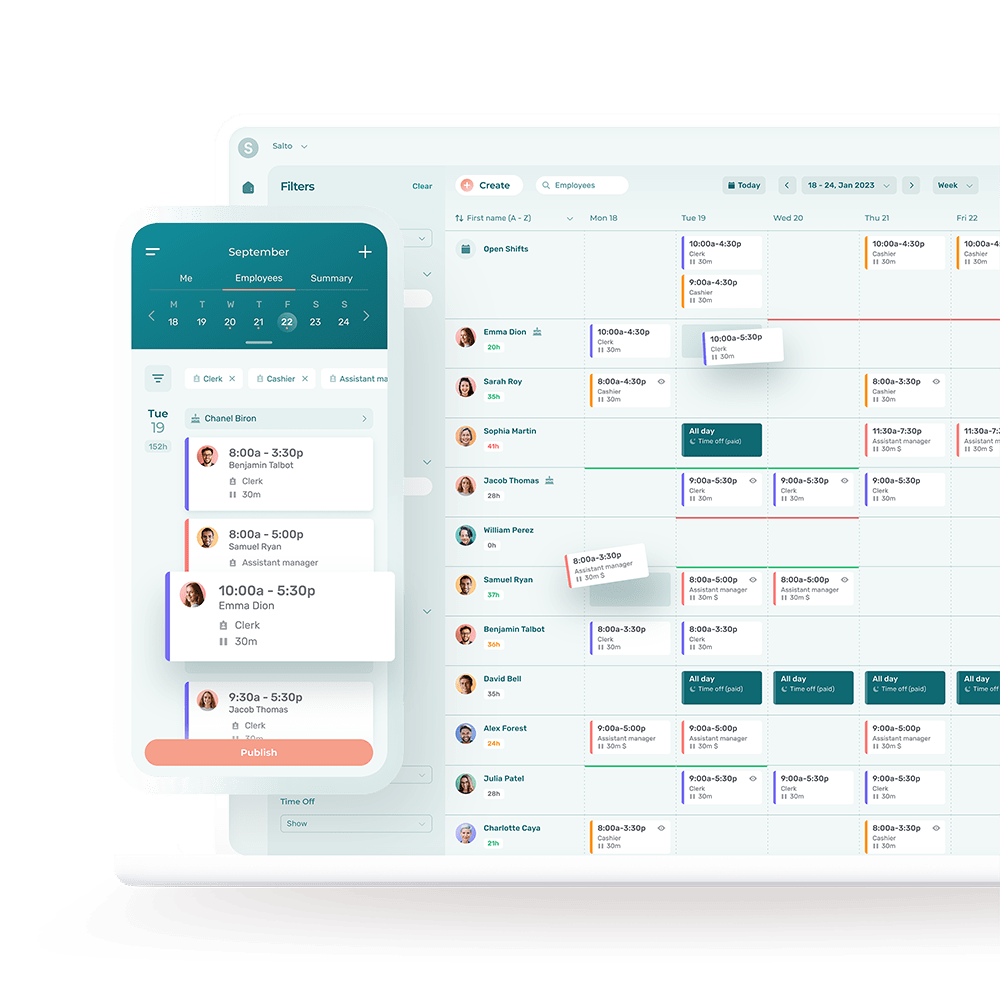Caring leadership has 3 main pillars: empathy, respect and support. Would you believe me if I told you that it’s impossible to be a good manager without putting these 3 elements into practice?
Caring leadership is a method in which managers actively listen to the concerns of their employees, give them constructive feedback, and recognize their achievements.
In this post, we’ll cover:
- A definition of caring leadership
- 9 tips for incorporating it into your HR practices
- 4 inspiring companies that apply caring leadership
A Definition of Caring Leadership
Caring leadership supports employees’ autonomy and work-life balance. It also offers opportunities for professional development.
In turn, this creates a positive work environment where employees feel valued and motivated. With this approach, managers can improve job satisfaction, drive employee engagement, and achieve better business outcomes.
9 Tips for Practising Caring Leadership
Apply these 9 tips to put caring management in place within your team.
1. Develop Positive Relationships
Encourage a work environment where employees feel comfortable communicating and voicing their concerns. Be approachable, open-minded and willing to take part in conversations.
2. Implement Active Listening
Active listening is a key quality of emotionally intelligent managers. So, take the time to listen to your employees carefully. Show empathy and make it clear that you care about their well-being. For example, if an employee tells you that they’re having a hard time at home, be supportive by offering to switch their shift with a colleague to free them up on a weeknight.
📣 Encouraging open and honest communication with your employees will give you a better grasp of what issues they’re experiencing, and ultimately help solve their problems more easily.
3. Recognize Your Employees’ Achievements
Celebrate their wins—big and small. Whether you do so in private or in public, this will strengthen their feelings of belonging and accomplishment. If this doesn’t come naturally to you, read on for 22 examples of recognition messages.
🚀 When you recognize and celebrate your employees’ efforts, you will start to notice higher motivation at work.
4. Promote Work-Life Balance
Be understanding of your employees’ needs: they all have a life outside of work. Offering flexibility and a healthy work-life balance will allow you to improve your retention rate.
🗓️ One easy way to do this is to take into account employees’ preferences and availability when drawing up the schedule.
5. Offer Professional Development Opportunities
Provide training and skill development opportunities for your employees so they can advance their careers. Professional development pays off quickly—in the short term, it helps your employees become more confident in their current roles, while better preparing them for the challenges of tomorrow.
6. Consider the Needs of Each Individual
In addition to employees’ skills, also consider their needs. This can be useful when assigning tasks and responsibilities, for example.
💡 If you feel an employee is ready for greater challenges, give them a task that entails greater responsibility, such as closing your restaurant. If, conversely, you feel that an employee is struggling with their tasks, why not pair them up with a more experienced employee who will be able to help them out?
7. Manage Conflict With Empathy
Work conflicts are a fact of life, whether we like it or not. So, treat these conflicts with sensitivity, encouraging open communication. Try to find fair solutions for everyone.
8. Encourage Collaboration and Autonomy
Foster collaboration within your team and give employees a degree of autonomy in their work.
🎈 Autonomy has multiple benefits: in addition to empowering your employees, it reduces the workload of managers. So why not kill two birds with one stone by focusing on autonomy to grow your team? As a bonus, this will also help improve collaboration!
9. Lead by Example: Be a Model of Caring
To encourage your employees to be caring, embody this practice yourself. Show empathy and be sure to maintain a positive and respectful attitude.
😵💫 Stress and difficult interactions with customers are a reality in the workplace. Stay alert to the emotional challenges your employees may encounter and offer them the support they need.
Glean Inspiration From Companies That Emphasize Caring Leadership
Learn about 4 companies and leaders that uphold practices and policies to promote employee well-being.
Patagonia
Patagonia is an outdoor apparel company renowned for its exemplary approach rooted in caring leadership. The company, founded in 1973 by Yvon Chouinard, sets itself apart by its positive company culture, social and environmental responsibility, and dedication to the well-being of its staff.
Caring leadership at Patagonia
- A values-based company culture: strong values associated with environmental protection, sustainability and ethics.
- Support for personal initiatives: employees are encouraged to pursue personal projects that have a positive impact on society.
- Significant employee benefits: examples include longer parental leave, a childcare program, sabbaticals, and financial incentives for public transit.
- Corporate social responsibility: measures are put in place to minimize the company’s environmental and social footprints. Patagonia actively supports conservation and environmental protection initiatives.
- A strong level of employee engagement: employees have a deep sense of belonging to Patagonia and feel valued for their work and the part they play in fulfilling the company’s mission.
Ben & Jerry’s
Ben & Jerry’s is an ice cream manufacturer known for its caring leadership and corporate social responsibility. Founded in 1978 by Ben Cohen and Jerry Greenfield, the company promotes strong values of social justice, ethics and respect for employees.
Caring leadership at Ben & Jerry’s
- Community engagement: employees are encouraged to get involved in the community, including through volunteer activities and support for social causes.
- Transparent communication: communication is open and transparent between leaders and employees. Managers share regular company updates and listen to employee concerns.
- Training and development opportunities: the company invests in employees’ training and professional development.
- Equity, diversity and inclusion: Ben & Jerry’s company culture is centred on equity, diversity and inclusion. The ice cream maker is actively involved in a number of social causes, including LGBTQ+ rights, criminal justice reform in the USA, and racial justice.
Salesforce
Salesforce is a customer relationship management software company. It is renowned for its company culture focused on employee well-being and its dedication to caring leaership. The company, founded in California in 1999, is committed to equality, diversity and inclusion.
Caring leadership at Salesforce
- Caring management team: the role of Salesforce leaders is critical to promoting caring leadership. They use an exemplary approach that fosters a culture of support and mutual respect.
- The importance of social engagement: employees are encouraged to get involved in social initiatives and volunteering that support communities locally and globally.
- Healthy work-life balance: flexible schedules and employee well-being are key.
- Professional development opportunities: employees have access to opportunities to progress in their careers, such as training, mentoring and coaching programs.
Google is a globally known technology company. Founded in 1998 by Larry Page and Sergey Brin, the tech giant is known for its innovative approach and caring leadership practices.
Caring leadership at Google
- Supportive work environment: the work environment is both stimulating and flexible. Google workplaces include play and leisure areas as well as facilities designed to inspire creativity and collaboration.
- Ongoing support for professional development: employees’ professional development is encouraged through mentoring programs, training opportunities, and exciting projects.
- Employee-centred company culture: Google strives to be a positive and inclusive place where employees feel valued and encouraged to make a meaningful contribution.
- Autonomy and accountability: innovation and initiative are encouraged by managers, who grant employees a high level of autonomy.
- Competitive employee benefits: staff have access to free meals, workplace gyms, health services, and more.
Caring Leadership Is a Win for Everyone
I hope the above tips and company profiles have given you some inspiration. In a nutshell, caring management is about common sense and treating others as you would like to be treated.
The 3 main pillars—empathy, respect and support—apply not only to our work relationships, but also to our personal lives. There’s no better time to know to put the above tips into practice. You’ll see the benefits for your team before you know it!
What Is Caring Leadership?
Caring leadership (or management) is a method of managing people that encourages autonomy, professional development, and work-life balance. It is based on 3 pillars: empathy, support and respect.
Managers who practise caring leaership create a positive work environment that motivates and values employees.
What Are the Benefits of Caring Leadership?
There are many benefits to caring leadership, including:
- Higher employee satisfaction
- Stronger employee engagement and sense of belonging
- Heightened productivity and performance
- Lower stress and staff turnover
- Enhanced communication and teamwork











